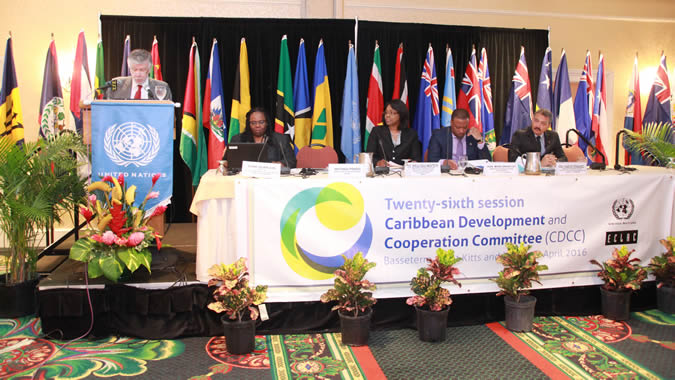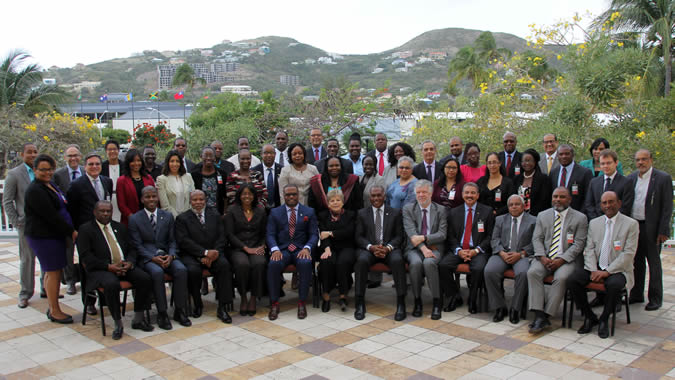Senior Government Officials Address Sustainable Development Priorities of the Caribbean
Work area(s)
The Deputy Executive Secretary of ECLAC, Antonio Prado, opened the 26th session of the Caribbean Development and Cooperation Committee in Saint Kitts and Nevis.

“The challenge facing the Caribbean is to identify paths to development that emphasize macroeconomic stability with growth, equity, and environmental sustainability. This will provide a bulwark against external shocks and the protection necessary for those that are most vulnerable”, Mr. Antonio Prado, Deputy Executive Secretary of ECLAC, said during the opening of the 26th session of the Caribbean Development and Cooperation Committee (CDCC), held in Basseterre, Saint Kitts and Nevis on 22 April 2016.
Addressing senior policy makers from across the subregion, Diane Quarless, Director of ECLAC Subregional headquarters for the Caribbean underscored that “national ownership, strong integrated policy planning, and effective institutional coordinating mechanisms are required to foster partnerships and enhance programme implementation as the Caribbean embarks on the 2030 Agenda for Sustainable Development.”
Ms. Quarless outlined a strategic approach to the implementation of the sustainable development goals (SDGs) in the Caribbean, in light of the unique challenges which the countries of the subregion continue to face. In her presentation, she emphasized the need to balance structural adjustment with sustainable development in the Caribbean, called for the harnessing of the subregion’s abundant skills in the creative industries so as to maximize economic returns, and underscored the need for improved productivity in all sectors.
Addressing the issue of the debt burden, the Honourable Charles Fernandez, Minister of Foreign Affairs, International Trade and Immigration of Antigua and Barbuda, presented a synthesis of the discussions held the previous day at the fourth Caribbean Development Roundtable. Minister Fernandez underscored the importance of examining measures to address the Caribbean’s debt obligations while seeking to promote sustainable development, and in that regard outlined proposals for more effective debt management while harnessing green industries to reignite growth and promote economic transformation.
Reflecting on the issue of Ageing in the Caribbean, The Honourable Frederick Stephenson, Minister of National Mobilization, Social Development, Gender Affairs, Family Matters, Persons with Disabilities and Youth of Saint Vincent and the Grenadines led the Committee’s consideration of the range of development challenges that will attend the ageing of the population in the Caribbean. The meeting took note of the fact that the number of persons in the Caribbean aged 65 and over will double over the next 25 years, resulting in significantly increased demands on health and social protection systems, given the high correlation between population ageing and increased prevalence of non-communicable diseases. Current trends also suggest that there will be a steady increase in the number of elderly persons not covered by national insurance schemes.
The CDCC is a subsidiary body of the United Nations Regional Economic Commission for Latin America and the Caribbean (ECLAC). Meetings of CDCC offer an opportunity for ECLAC Caribbean to highlight the achievements of work undertaken during the 2014 – 2015 biennium, and to forecast its programme of work for the coming biennium, 2018 – 2019. The subregional office serves 26 countries in the wider Caribbean.
Ms. Quarless described programmes in resilience-building and disaster assessment, measurement of paid and unpaid work, dissemination of microdata, improvements in the Damage and Loss Assessment (DaLA) methodology, and research on digital currency and population ageing in the Caribbean, as examples of the areas in which ECLAC’s Member States and Associate Member territories benefitted from the support of the Organization over the past two years.
The Committee welcomed Sint Maarten as a new associate member of ECLAC to the CDCC.
ECLAC is the regional organization that embraces the largest number of Associate Members in the Caribbean, including territories of the English, French, Spanish and Dutch Caribbean. With the inclusion of Sint Maarten, the number of countries which are members of CDCC increases to 29, offering a rich diversity in policy discourse and programme implementation.
For further information, please contact Alexander Voccia at alexander.voccia@eclac.org or Denise Balgobin at denise.balgobin@eclac.org. Telephone: (868) 224-8067/224-8075.
Related content

ECLAC Presents a Debt Alleviation Strategy Based on a Debt Swap Proposal at High-level Meeting in Saint Kitts
The Executive Secretary of the United Nations’ Commission, Alicia Bárcena, detailed the proposal during the fourth meeting of the Caribbean Development Roundtable (CDR).

26th Session of the Caribbean Development and Cooperation Committee
Opening Statement by Antonio Prado, Deputy Executive Secretary of ECLAC.
Subregional headquarter(s) and office(s)
Related link(s)
Country(ies)
Contact
Alexander Voccia
- alexander.voccia@eclac.org
- 868 224 8067
